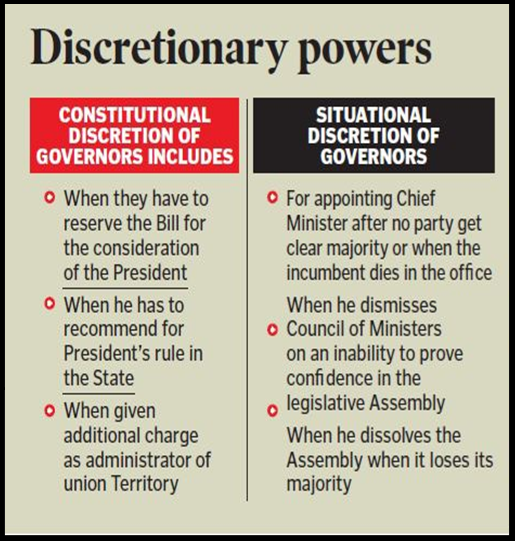NO VETO POWER FOR GOVERNORS
Why in the News?
- The Supreme Court’s recent ruling on Governor’s withholding assent to Punjab’s Bills highlights the removal of the Governor’s veto power.
- This significant decision emphasizes the essence of a parliamentary democracy, emphasizing the elected regime’s responsibility to the legislature.
Source: Telangana today
Context of the Case:
- Originating from Punjab, the case questioned the Governor’s authority to unilaterally withhold assent to Bills passed by the State Assembly.
- Governor Purohit claimed these Bills were adopted in an illegal session, leading to a constitutional scrutiny.
Supreme Court’s Verdict:
- The ruling emphasizes that Governors do not possess a unilateral veto in a parliamentary democracy.
- It aligns with the fundamental principle that an elected government, accountable to the legislature, manages the state’s affairs.
Article 200 and Assent to Bills:
- The Court’s interpretation of Article 200’s scheme clarifies that Governors cannot wield unchecked power over Bills.
- While granting assent is routine, withholding or reserving a Bill for the President has historically sparked controversy.
Power to Withhold Assent:
- The Court underscores that whenever a Governor withholds assent, the Bill must be sent back to the legislature for reconsideration.
- This prevents Governors from indefinitely delaying action on legislative proposals.
Clear Reproof to Governors:
- The Court delivers a reprimand, asserting that Governors must act promptly in a system where they primarily function on the advice of the Council of Ministers.
Rejection of Illegal Session Claim:
- Governor Purohit’s argument that the Assembly session was illegal due to the Speaker’s actions is dismissed by the Court.
- The Court clarifies that the adjourned session was not prorogued, affirming the legality of the Assembly’s actions.
Potential Residual Controversies:
- The ruling eliminates the Governor’s unilateral power but raises concerns about Bills disapproved by Governors being referred to the President.
- Safeguards may be necessary to prevent Governors from bypassing the legislative process.
The verdict brings clarity to the delicate balance between elected regimes and gubernatorial roles in law-making, fostering a healthier democratic process.

 Source: Telangana today
Source: Telangana today

